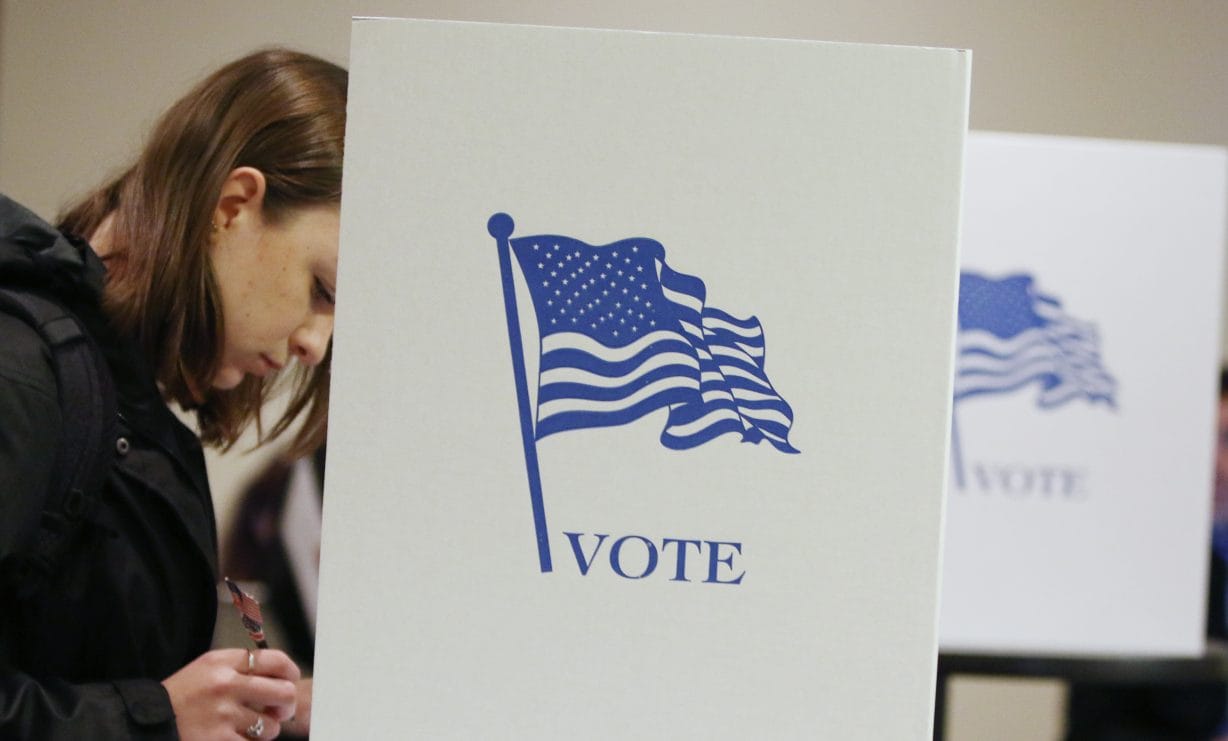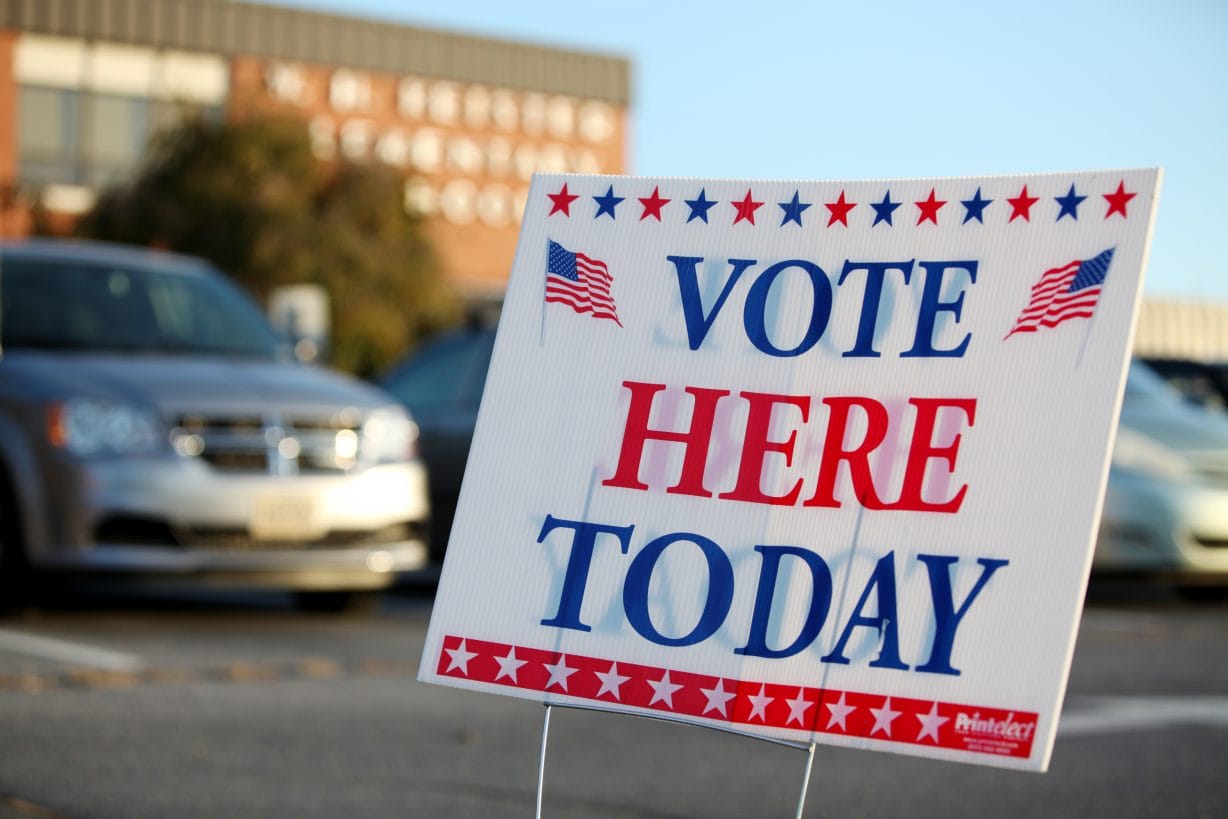
By Rachel Petterson, contributor
Voter turnout in this month’s general election was lower than the last midterm in 2018, but to Mark Finks, Harrisonburg’s registrar, turnout matched expectations.
Finks said there was an uptick in young voters locally, but their turnout rates still appear lower than what was seen nationally. Of course, each election comes with its own set of variables, and Harrisonburg — especially because of the number of college students at JMU and EMU — has a particularly transient population.
Preliminary data from the city shows 39.76% of registered voters participated in the election.
“We were projecting around a 40% turnout,” Finks said. “So as far as the turnout’s concerned, no, there wasn’t anything surprising.”
In the 2018 November general election, 56.72% of registered voters participated, according to data from the Virginia Department of Elections. That election saw high turnout nationwide, and also included a U.S. Senate race in Virginia when Sen. Tim Kaine faced Republican challenger Corey Stewart.
Furthermore, this year’s election was Virginia’s first since 2010 in which there was no state-wide race, like a U.S. Senate seat, on Harrisonburg’s ballot. In fact, the only races this year were the U.S. House seat for this area, three seats on the city’s school board, two four-year terms for city council seats and one special election to finish out the last half of another council seat’s term.
Comparing this year’s turnout to the 2010 general election, the turnout 12 years ago was markedly lower, at 30.71%. While every election season has its own context, the biggest difference between 2010 and 2022 was the expanded ability for voters to cast their ballot early. Virginia changed its rules to allow for more early voting in 2020 amid the early months of the COVID-19 pandemic.
As a result, about 40% of voters who participated in this year’s election cast their ballots in a way other than showing up in person to the polls on Election Day, according to data from the city.
This was also the first year that voters could vote on Election Day regardless of whether they had registered by the deadline, which this year was Oct. 17.
“Before this law came into effect this year, basically if you missed the deadline … then likely we would not be able to vote to count your ballot,” Finks said. “So with this law change, it allows people to [do] same-day registration — to fill out a voter registration and then vote that day.”
That means the local election staff have some additional work in the days after the election.
“We then look through the system to see if they would be eligible to be able to make sure there is anything that wouldn’t allow them to be a registered voter in the state of Virginia or Harrisonburg,” Finks said. “And if there’s nothing saying that they shouldn’t be or couldn’t be, then we can, at that point, count the registration.”
The local electoral board also has to vote to approve the final numbers.
Finks said the 356 provisional ballots this year was more than normal, but even that increase had little effect on the total turnout.
“This election did not create a large difference in turnout in that regard, but I also think it’s something that people are not completely aware of, either,” Finks said.
Consistent candidate selections across the city
Across all eight of Harrisonburg’s precincts, the election results were the same for all seats on the ballot, with the only exception being the Smithland Elementary precinct’s results for one of the city council seats. Voters there chose Rick Nagel and Monica L. Robinson as the top two candidates, while Robinson and Dany R. Fleming finished in the top two in all other precincts.
Harrisonburg voters, as they’ve done in recent elections, leaned toward the Democratic candidate in the U.S. House race as Democrat Jennifer Lynn Lewis won the city with an estimated 2,707 more votes than Republican U.S. Rep. Ben L. Cline, who easily won reelection across the rest of the 6th Congressional District that stretches across the Shenandoah Valley south to Roanoke.
More young voters?
The Tuft Center for Information & Research on Civic Learning and Engagement reported that, nationwide, an estimated 27% of eligible voters between the ages of 18 and 29 voted in this year’s midterm election.
“This 2022 youth turnout is likely the second-highest youth turnout rate for a midterm election in the past 30 years, behind only the historic 31% turnout in 2018,” according to that report.
In Harrisonburg, though, 17.9% of registered voters 18-25 years old participated in this election, based on the released preliminary data. This means that an even lower percentage of eligible voters cast a ballot.
The way local data is grouped, it is not possible to know the percentage of voters between 18 and 29, but this percentage of registered voters up to 25 points to a lower rate of younger voter turnout locally. And less than half of the 270 people in Harrisonburg who turned 18 years old this year and registered to vote ended up casting a ballot. The city’s turnout rate was 47.4% for registered 18-year-olds.
JMU campus precinct turnout drops again
Beyond each election ballot being different, elements of Harrisonburg itself make it difficult to compare elections to each other.
“Harrisonburg is such a transient population. We have people registering, moving in, moving out all the time,” Finks said. “It’s not a static thing, where our registered numbers of voters can change so much each year. So it’s a hard thing to really pin down.”
With JMU and EMU, thousands of young voters have the chance to vote in Harrisonburg where they live for school or can choose to vote by absentee ballot in the area of their parent or guardian’s address. This makes it difficult to gauge the actual voting trends of young people in Harrisonburg.
Only 162 people voted this year at the precinct on JMU’s campus at Godwin Hall. That was, by far, the lowest number of voters for any of the eight precinct locations.
The JMU precinct covers on-campus housing, as well as some homes near the campus, but many JMU students live in apartments elsewhere in the city or over the city-county line. Moreover, even if a student lives on campus they may choose to vote at their home address instead of their school address.
Finks said the numbers have gone down in the JMU precinct the last three elections, including the presidential election year of 2020 when turnout among young voters is typically higher. But in the fall of 2020, the pandemic likely played a role, Finks said.
“Our best guess is that it was probably because a lot of students were either taking classes online and weren’t sure that they were actually going to be in the city of Harrisonburg on Election Day and decided to keep their registration at their parent’s home where they likely thought that they could be,” he said.
He said he believes fewer students on campus have registered to vote because third-party organizations that host voter registration drives have been less active.
“We didn’t see that rebound for the governor’s race, and we didn’t see that rebound this year either. So the numbers of actual registered students that live on campus have continued to drop,” he said.
For those who go away to college, voting can come with a special set of challenges and confusions. Not all students may be aware that they can choose to register at their “home” address or the address they live at while going to school. Finks said he is sympathetic.
“We work with a lot of students and when you’re moving to a different place every year,” he said. “You’re living on campus one year, you’re living over here the other year and living in a house the year after that. Keeping track of that stuff can be difficult.”
Some students also worry that choosing to register in a different state will impact their financial aid if it is based on their residency. Finks said he is not able to provide definitive answers to that.
“Sometimes it can–not that often–but there are certain situations where it could create an issue for them if they’re getting financial help from another state and they’re now, you know, resident of a different state,” he said. “So it’s kind of up to them to figure that out. So it’s another layer of things to work through and figure out when you just want to vote.”

Registrar Continues Receiving Requests for Information on 2020 Election
Since the 2020 presidential race, local voting officials have come under scrutiny, especially from supporters of Donald Trump who sought evidence of vote tampering or fraud. In some localities across the country, many media outlets, such as NBC, have reported that registrar’s offices and city clerks have been flooded with Freedom of Information Act requests. Sometimes, the volume has been so high that it interferes with tasks of the office.
In Harrisonburg, Finks said interest in public records has increased, mostly regarding the 2020 and 2021 elections, but not to a level that his office’s regular business has been impeded. That is because some of the requests cannot be fulfilled because the records they’re asking for can “only be viewed through a court order” or a Board of Elections recount, Finks said.
“We’ve definitely seen an increase in interest from the public or maybe not necessarily the general public, but…public groups that are interested in seeing records and documents,” he said.
These requests have included asking for statements of results and information about how election machines work.
Finks said questions regarding the 2020 presidential election still come in occasionally. In fact, he said he has received one or two in the last month.
Journalism is changing, and that’s why The Citizen is here. We’re independent. We’re local. We pay our contributors, and the money you give goes directly to the reporting. No overhead. No printing costs. Just facts, stories and context. We’re also a proud member of the Virginia Press Association. Thanks for your support.












